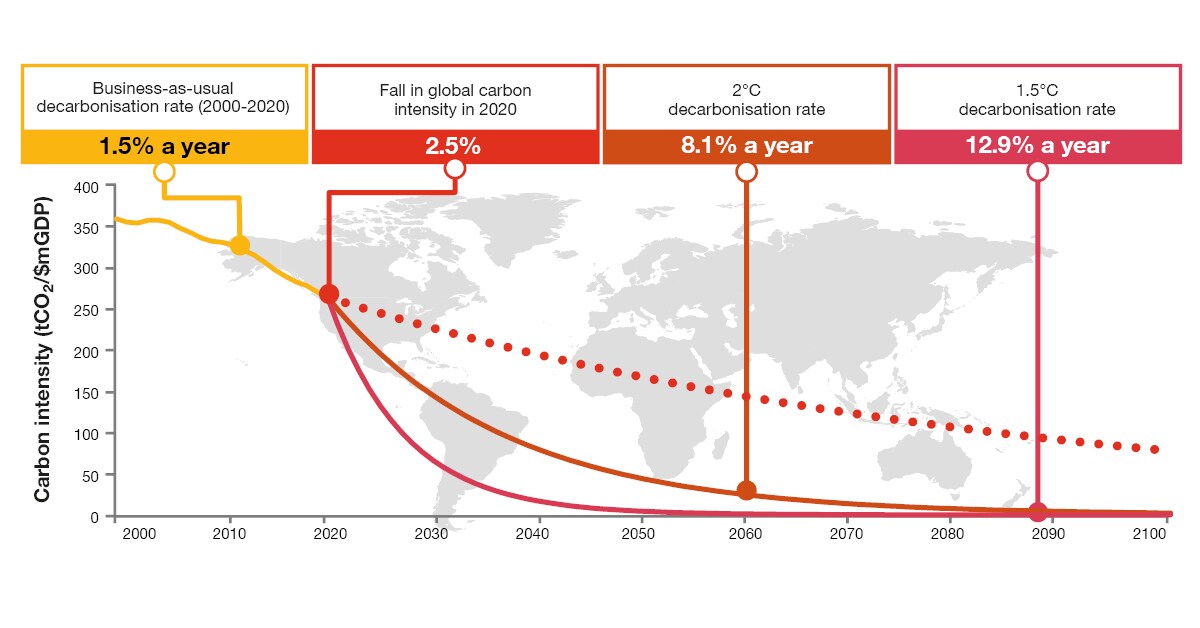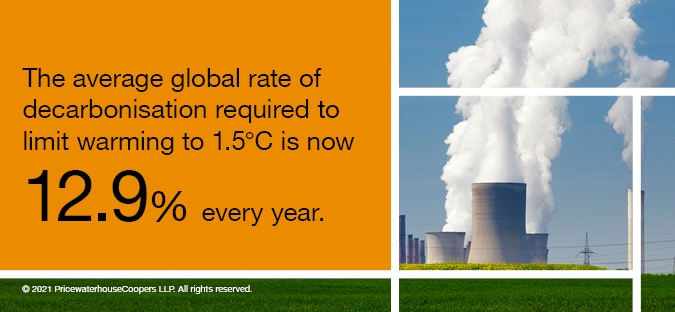
The Intergovernmental Panel on Climate Change (IPCC) in their recent report issued a code red that there is more than a 50% chance that we will reach 1.5°C warming within the next two decades if emissions continue at their current rates.
Whilst many countries have strengthened their commitments, it is clear that ambition is nowhere near enough to keep global warming to 2°C let alone 1.5°C. It is in this context that this year’s Net Zero Economy Index examines the rate of decarbonisation needed to deliver a 1.5°C aligned net zero world by 2050 and examines how G20 member states are faring against what is required.
The global picture in 2020

Figure 1: Net Zero Economy Index 2021
A 12.9% annual global rate of decarbonisation is now required to limit warming to 1.5°C. In 2020 the rate of global decarbonisation - the reduction in carbon intensity or energy-related CO2 emissions per dollar of GDP - was 2.5%. This rate represents a very slight improvement from last year’s rate of 2.4%, but is still significantly lower than the annual global rate of decarbonisation required to achieve the 1.5ºC goal.
Whilst the impact of COVID-19 continues to be felt across the world, many countries are beginning to lift restrictions. With it we are seeing a resurgence in economic activity and a rebound in emissions. The growth in emissions during 2021 has been driven by an increase in demand for coal in electricity generation. Despite efforts by some governments to stimulate a green recovery, global energy demand is set to increase by 4.6% in 2021 – led largely by emerging markets and developing economies.

Over the past year, business and governments have significantly stepped up their ambition to act on climate change. But despite the ambition, the emissions gap continues to widen. Simply, the action taken to date has not been enough to meet the scale and urgency of the climate crisis facing the world. All sectors of the economy will need to transform to deliver net zero.
G20 performance

Table 1: Net Zero Economy Index 2021 - G20 performance across energy-related CO2
The PwC Net Zero Economy Index tracks the rate of decarbonisation of the G20 across energy-related CO2 emissions. Within the G20, Mexico and Indonesia recorded the highest rates of emissions reductions relative to their economic growth. Across these countries, energy-related emissions fell by 12.4% and 10.6% respectively on 2019 levels, largely due to economic restrictions in response to the pandemic. These results are expected to be an isolated occurrence rather than evidence of a longer-term trend as each country has announced plans to invest in fossil fuel production in 2021. None of the G20 member states achieved the 12.9% rate of decarbonisation now required to limit warming to 1.5°C.
The private sector has a vital role to play in delivering positive climate action. Delivering net zero by mid-century will require collaboration between sectors and across industry, however businesses can’t go it alone. Government and business leaders must heed what the climate science is telling us- we need higher ambition and an acceleration of action to keep 1.5°C in striking distance. The window of opportunity is narrow so it’s imperative we take more decisive action now.





